Genre: Platform Developer: Core Design Publisher: Virgin Games Players: 1 Released: 1991
Although falling short of becoming a classic of its era, there’s no denying that Chuck Rock, as experienced on Amiga or 16-bit consoles, had plenty of personality. From quirky character and enemy designs – potbellied cavemen and Tyrannosaurs in boxer shorts – to environments alive with detail and an inexplicably brilliant main theme, it molded a game entirely confident in its presentation. If not for the hit-or-miss gameplay, the cartoon-like visuals and hyperactive music made it well worth checking out Chuck Rock’s oddball charm.
The Master System conversion is devoid of this charm. If confidence of presentation can be measured by the faithful recreation of levels down-scaled from 16- to 8-bit, then this version has it in spades. Unfortunately, it doesn’t count for much because while the levels remain largely the same as on Mega Drive/Genesis, almost every other feature is either downgraded or removed entirely.
The game is ugly. The backdrops of each of Chuck Rock’s nineteen rounds are non-existent. In their place is a pitch-black darkness that does nothing to set the scene. The foreground is detailed and the character/enemy designs and animations translate well from 16-bit versions, but this isn’t nearly enough to distract from the ominous void that forms the background. To truly understand the impact this has on the game, picture the vibrant environments of something like Ristar, then imagine the background to be entirely absent. You’re left with something butchered beyond recognition, with little trace of its original theme. Keen-eyed players will be able to decipher the setting of each world (jungle, cave, coast, ice cavern and graveyard), but generally it feels as though part of the game’s missing, because it is.
Chuck Rock is also mute. Except for a memorable 8-bit rendition of the same theme found in other versions, there is no music throughout the game. It all goes quiet from the start of the first level. The few sound effects present in the game are lifeless at best and actively annoying at worst, such as the repetitive high-pitched beeps that come with flying enemies. Together with the visual downscaling, the game quickly becomes a joyless affair, bearing a stronger resemblance to some budget Game Boy title than what’s usually seen on the Master System.
The control is functional. The game itself plays as well as it does on other versions, which may be the only thing that justifies the existence of this port… or not. All the flaws of the 16-bit Chuck Rock are here: the static, short-ranged main attack, the titular but ill-advised rock-chucking mechanic, the short length and simplistic design – and here it’s so much worse because without the colourful, confident presentation of those versions, there’s much less incentive to get to the end of each round. Glimpses of good platforming can be found on occasion, bolstered by responsive controls and fluid movement, but it’s hard to appreciate this with so much working against it. The high point is probably the boss fights, which carry over well and where the graphical and audio repercussions aren’t quite as intrusive. But they come with an elevated difficulty, demanding precision and as quick reflexes as the controls allow. Ordinarily this would be no bad thing, but in Chuck Rock’s case, finding yourself out of lives and back at the start of the game may well be enough to put you off playing for good.
The gameplay is also lazy. Even basic features, such as an in-game display of your score and the ability to gain extra lives, are absent here. Collecting points serves solely the purpose of reaching the highest score, viewable only at the end of the game. Very often, Master System conversions of Mega Drive/Genesis titles were built from the ground up, and just as often with great results. Chuck Rock is an example of what happens when they aren’t. What’s surprising is that developers Core Design were well known for their work on Sega consoles, and hold a respectable track record. The Master System version of the sequel, Chuck Rock II: Son of Chuck, features both animated backdrops and in-game music, making it hard to justify their absence in this version.
Overall, this port is redundant. Chuck Rock is not quite a disaster, playable from start to finish by the patient and the idle-minded, but there’s absolutely no reason to choose the Master System version over any other. For those interested in checking out the game at all, the Mega Drive/Genesis version comes recommended, and it’s there you can judge the game at its best. Better to let this one sink into (pre)history.
Score: 3 out of 10

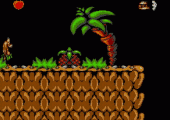
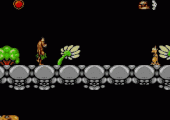
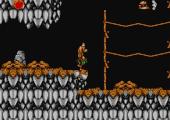
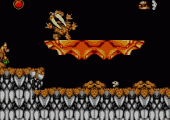
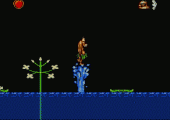
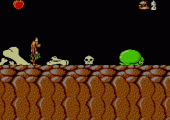
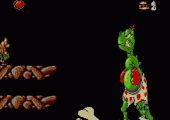
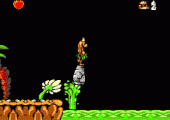

Recent Comments